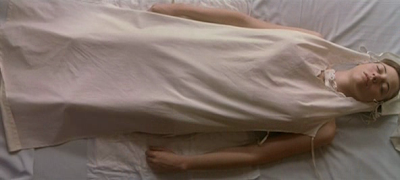Before you read on, play this. Now read on.
There is a question that anyone who sees Talk to Her will ask a beloved, existent or otherwise: if I fall into a coma, will you leave me? Will your love persist? This is a prosaic way to put it, and the discerning lover can easily ask back, Is that still you, somewhere in that vegetative body, peeking in between the automatic operations of your biology? Isn't life, after all, kinetic, and to proclaim a thing lifeless is to comment on its inactivity?
Precisely why Talk to Her is so fixated on the body, graceful and sensuos, limiting and yet boundless to he who persists and insists on an alternative. The two ladies in a coma are both corporeal creatures: a ballerina (Alicia) and a bullfighter (Lydia). The film takes great pain in illustrating this alertness to this phenomenon, in showing, to cite, how the two are dressed: lifeless Alicia in fine, virginal hospital linen and Lydia in rigid, ornate torero attire.
 |
| Skinny jeans ang peg. |
Benigno is Alicia's private nurse of four years who is revealed to have shown a creepy-endearing obsession toward her when she was still, well, alive. On the other hand, Marco, Lydia's boyfriend of a few months, is a hard-nosed journalist who cannot even look at her limp, bruised body. In classic Almodóvar fashion (-Christian), the two form a strange friendship over their shared misery. "Talk to her," Benigno tells an incredulous Marco, who predictably doesn't listen.
Things take an interesting turn when Alicia becomes pregnant (foreshadowed, I thought, by that otherwise just revolting cleaning-up-the-regla scene in the beginning). Benigno, whose "rape" of Alicia - an almost incommunicable event - is dramatized in congruently stunning fashion, claims that their love for each other is superior to those of law-abiding humans. Interesting: I, for one, believe him.
 |
| Nope, that's not a hirsute cardboard wall. |
Outside the discourse (and this blog's tenacious overreading), the two's friendship is tender in its unlikelihood. "I have hugged very few people in my life," an incarcerated Benigno tells Marco across a glass pane. He describes the four years of attending to a near-corpose the "most complete years" of his life. His final act of love is as inevitable as it is logical.
For his part, Marco, who, after his divorce, couldn't sleep on the matrimonial bed and had to buy a new one, all too willingly took residence in Benigno's sad, haunted apartment. From someone who doesn't understand, Marco has called Benigno "the only friend" he has (transformation, as always, being the hallmark of truly fruitful human relationships). And if the fading "subtitle" were to be trusted, a story seems to be in the offing for Marco and the recovering Alicia, who gets a glimpse, just like Benigno, of a grown-up man crying over something so beautiful.
So what is the tragedy here? That Benigno's love for Alicia has to transpire in an alternate plane, where bodies are not prisons and appearances do not constrict? That it has to manifest in ways that are unethical and criminal, in noctural transgressions and secret monologues. No: that this kind of love, in its purity, is deemed to have no place in the waking, cruel world.
Now play this.



No comments:
Post a Comment